FCT v Stone and FCT v Rowe: A Study in Australian Taxation Law
VerifiedAdded on 2023/04/04
|6
|762
|265
Case Study
AI Summary
This case study provides a comprehensive analysis of the legal principles and outcomes in the cases of FCT v Stone (2005) and FCT v Rowe (1997), focusing on the interpretation of ordinary income and the deductibility of expenses under Australian taxation law. The analysis highlights the differing treatments of government grants and legal expenses, examining the factors that led the court to consider the grants in Stone's case as income due to the taxpayer's profit-making intention through sporting activities, while legal fees in Rowe's case were not deemed deductible as they were not directly related to income generation. The study contrasts the circumstances and legal reasoning in each case, offering insights into the application of Section 6-5 of the ITAA 1997 and the judicial interpretation of income and deductions. Desklib provides more solved assignments and study resources for students.
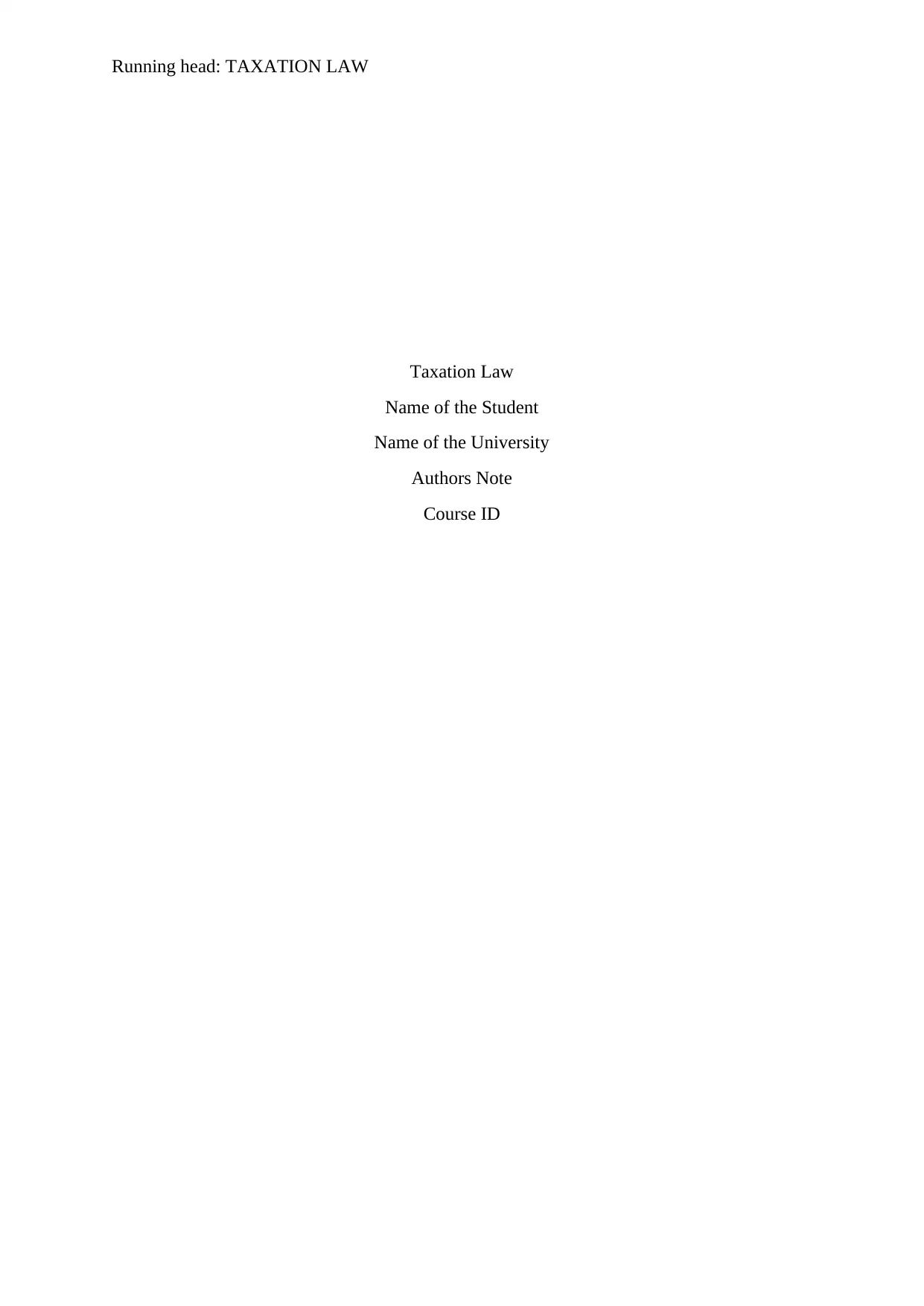
Running head: TAXATION LAW
Taxation Law
Name of the Student
Name of the University
Authors Note
Course ID
Taxation Law
Name of the Student
Name of the University
Authors Note
Course ID
Paraphrase This Document
Need a fresh take? Get an instant paraphrase of this document with our AI Paraphraser
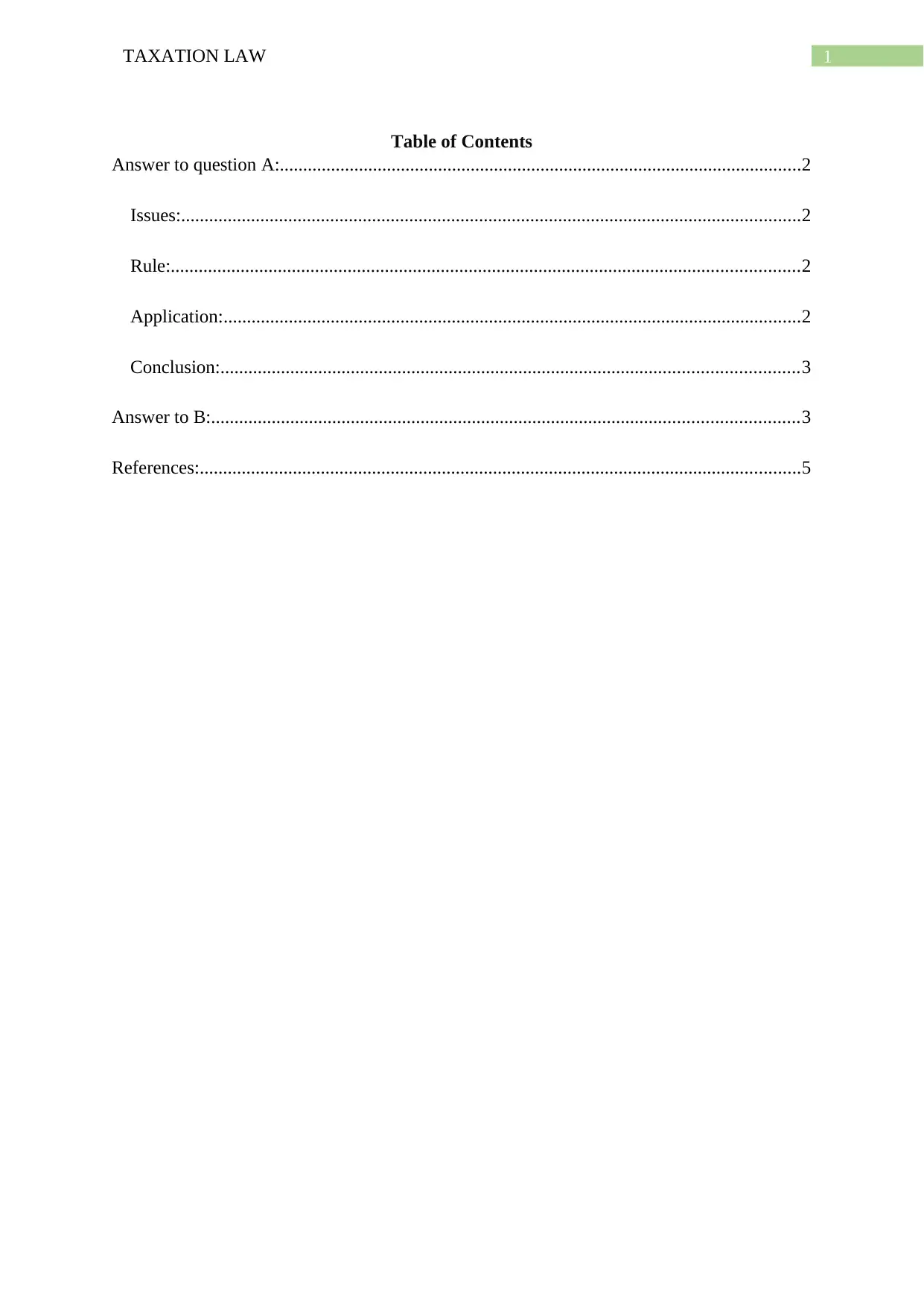
1TAXATION LAW
Table of Contents
Answer to question A:................................................................................................................2
Issues:.....................................................................................................................................2
Rule:.......................................................................................................................................2
Application:............................................................................................................................2
Conclusion:............................................................................................................................3
Answer to B:..............................................................................................................................3
References:.................................................................................................................................5
Table of Contents
Answer to question A:................................................................................................................2
Issues:.....................................................................................................................................2
Rule:.......................................................................................................................................2
Application:............................................................................................................................2
Conclusion:............................................................................................................................3
Answer to B:..............................................................................................................................3
References:.................................................................................................................................5
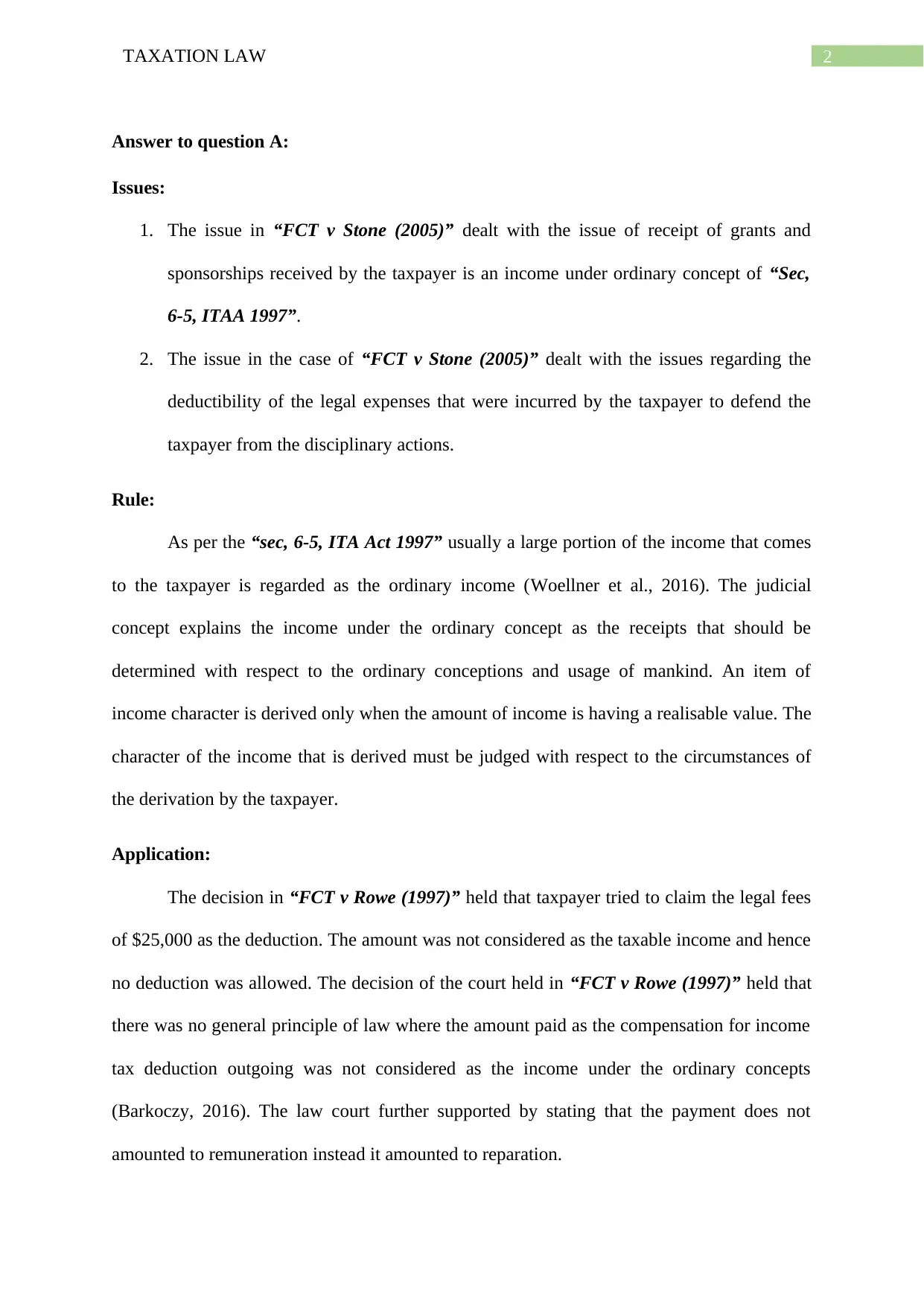
2TAXATION LAW
Answer to question A:
Issues:
1. The issue in “FCT v Stone (2005)” dealt with the issue of receipt of grants and
sponsorships received by the taxpayer is an income under ordinary concept of “Sec,
6-5, ITAA 1997”.
2. The issue in the case of “FCT v Stone (2005)” dealt with the issues regarding the
deductibility of the legal expenses that were incurred by the taxpayer to defend the
taxpayer from the disciplinary actions.
Rule:
As per the “sec, 6-5, ITA Act 1997” usually a large portion of the income that comes
to the taxpayer is regarded as the ordinary income (Woellner et al., 2016). The judicial
concept explains the income under the ordinary concept as the receipts that should be
determined with respect to the ordinary conceptions and usage of mankind. An item of
income character is derived only when the amount of income is having a realisable value. The
character of the income that is derived must be judged with respect to the circumstances of
the derivation by the taxpayer.
Application:
The decision in “FCT v Rowe (1997)” held that taxpayer tried to claim the legal fees
of $25,000 as the deduction. The amount was not considered as the taxable income and hence
no deduction was allowed. The decision of the court held in “FCT v Rowe (1997)” held that
there was no general principle of law where the amount paid as the compensation for income
tax deduction outgoing was not considered as the income under the ordinary concepts
(Barkoczy, 2016). The law court further supported by stating that the payment does not
amounted to remuneration instead it amounted to reparation.
Answer to question A:
Issues:
1. The issue in “FCT v Stone (2005)” dealt with the issue of receipt of grants and
sponsorships received by the taxpayer is an income under ordinary concept of “Sec,
6-5, ITAA 1997”.
2. The issue in the case of “FCT v Stone (2005)” dealt with the issues regarding the
deductibility of the legal expenses that were incurred by the taxpayer to defend the
taxpayer from the disciplinary actions.
Rule:
As per the “sec, 6-5, ITA Act 1997” usually a large portion of the income that comes
to the taxpayer is regarded as the ordinary income (Woellner et al., 2016). The judicial
concept explains the income under the ordinary concept as the receipts that should be
determined with respect to the ordinary conceptions and usage of mankind. An item of
income character is derived only when the amount of income is having a realisable value. The
character of the income that is derived must be judged with respect to the circumstances of
the derivation by the taxpayer.
Application:
The decision in “FCT v Rowe (1997)” held that taxpayer tried to claim the legal fees
of $25,000 as the deduction. The amount was not considered as the taxable income and hence
no deduction was allowed. The decision of the court held in “FCT v Rowe (1997)” held that
there was no general principle of law where the amount paid as the compensation for income
tax deduction outgoing was not considered as the income under the ordinary concepts
(Barkoczy, 2016). The law court further supported by stating that the payment does not
amounted to remuneration instead it amounted to reparation.
⊘ This is a preview!⊘
Do you want full access?
Subscribe today to unlock all pages.

Trusted by 1+ million students worldwide
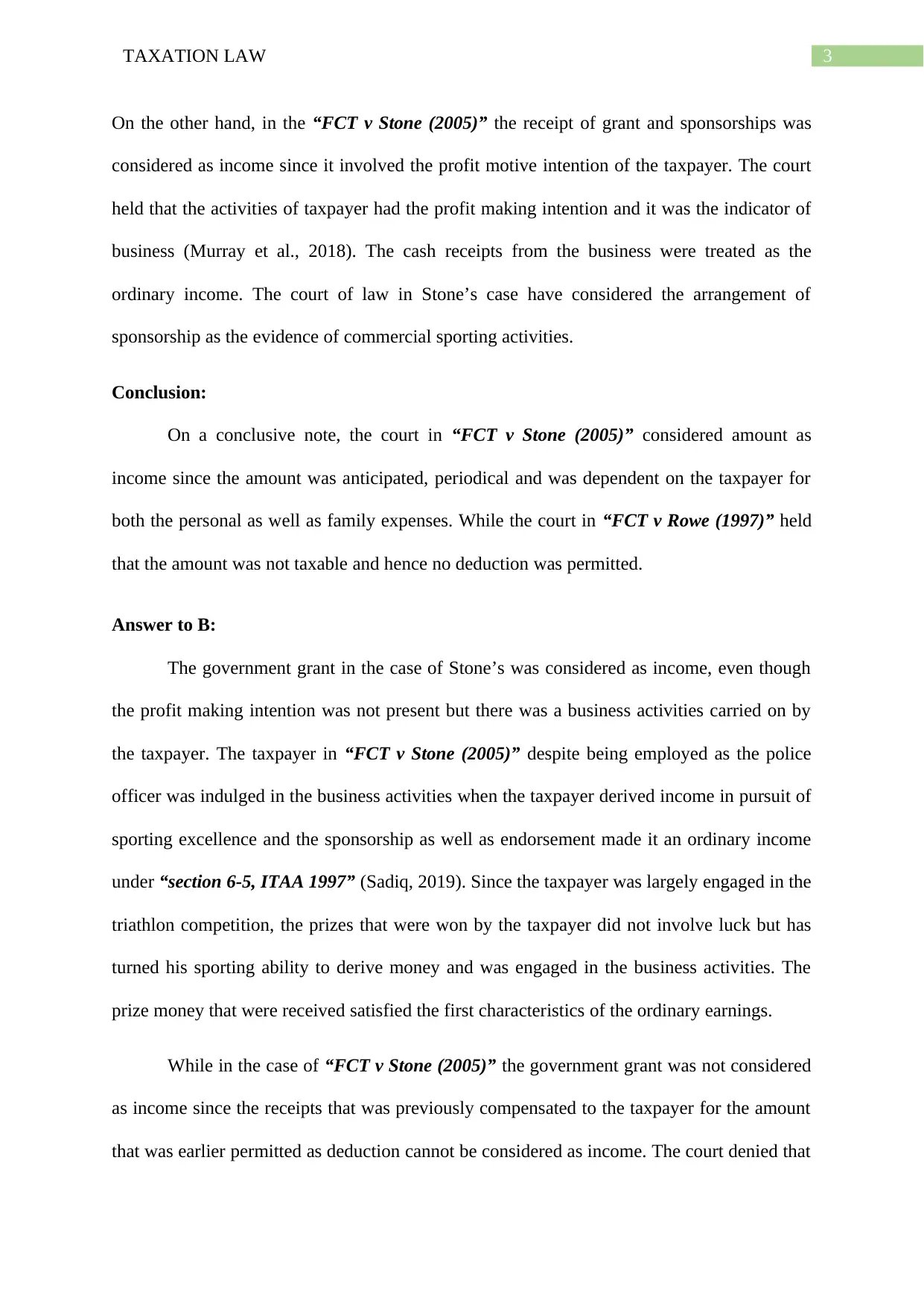
3TAXATION LAW
On the other hand, in the “FCT v Stone (2005)” the receipt of grant and sponsorships was
considered as income since it involved the profit motive intention of the taxpayer. The court
held that the activities of taxpayer had the profit making intention and it was the indicator of
business (Murray et al., 2018). The cash receipts from the business were treated as the
ordinary income. The court of law in Stone’s case have considered the arrangement of
sponsorship as the evidence of commercial sporting activities.
Conclusion:
On a conclusive note, the court in “FCT v Stone (2005)” considered amount as
income since the amount was anticipated, periodical and was dependent on the taxpayer for
both the personal as well as family expenses. While the court in “FCT v Rowe (1997)” held
that the amount was not taxable and hence no deduction was permitted.
Answer to B:
The government grant in the case of Stone’s was considered as income, even though
the profit making intention was not present but there was a business activities carried on by
the taxpayer. The taxpayer in “FCT v Stone (2005)” despite being employed as the police
officer was indulged in the business activities when the taxpayer derived income in pursuit of
sporting excellence and the sponsorship as well as endorsement made it an ordinary income
under “section 6-5, ITAA 1997” (Sadiq, 2019). Since the taxpayer was largely engaged in the
triathlon competition, the prizes that were won by the taxpayer did not involve luck but has
turned his sporting ability to derive money and was engaged in the business activities. The
prize money that were received satisfied the first characteristics of the ordinary earnings.
While in the case of “FCT v Stone (2005)” the government grant was not considered
as income since the receipts that was previously compensated to the taxpayer for the amount
that was earlier permitted as deduction cannot be considered as income. The court denied that
On the other hand, in the “FCT v Stone (2005)” the receipt of grant and sponsorships was
considered as income since it involved the profit motive intention of the taxpayer. The court
held that the activities of taxpayer had the profit making intention and it was the indicator of
business (Murray et al., 2018). The cash receipts from the business were treated as the
ordinary income. The court of law in Stone’s case have considered the arrangement of
sponsorship as the evidence of commercial sporting activities.
Conclusion:
On a conclusive note, the court in “FCT v Stone (2005)” considered amount as
income since the amount was anticipated, periodical and was dependent on the taxpayer for
both the personal as well as family expenses. While the court in “FCT v Rowe (1997)” held
that the amount was not taxable and hence no deduction was permitted.
Answer to B:
The government grant in the case of Stone’s was considered as income, even though
the profit making intention was not present but there was a business activities carried on by
the taxpayer. The taxpayer in “FCT v Stone (2005)” despite being employed as the police
officer was indulged in the business activities when the taxpayer derived income in pursuit of
sporting excellence and the sponsorship as well as endorsement made it an ordinary income
under “section 6-5, ITAA 1997” (Sadiq, 2019). Since the taxpayer was largely engaged in the
triathlon competition, the prizes that were won by the taxpayer did not involve luck but has
turned his sporting ability to derive money and was engaged in the business activities. The
prize money that were received satisfied the first characteristics of the ordinary earnings.
While in the case of “FCT v Stone (2005)” the government grant was not considered
as income since the receipts that was previously compensated to the taxpayer for the amount
that was earlier permitted as deduction cannot be considered as income. The court denied that
Paraphrase This Document
Need a fresh take? Get an instant paraphrase of this document with our AI Paraphraser
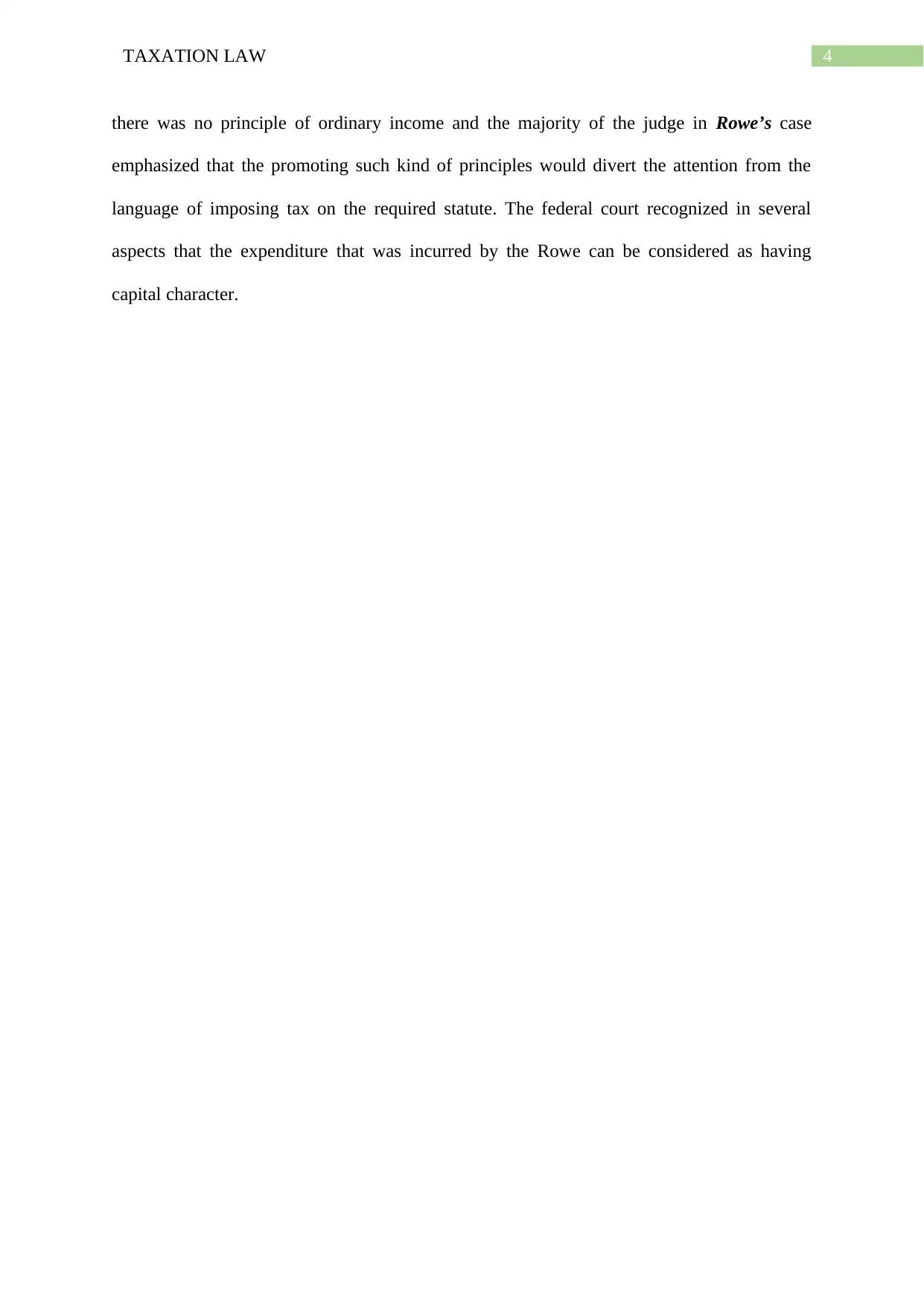
4TAXATION LAW
there was no principle of ordinary income and the majority of the judge in Rowe’s case
emphasized that the promoting such kind of principles would divert the attention from the
language of imposing tax on the required statute. The federal court recognized in several
aspects that the expenditure that was incurred by the Rowe can be considered as having
capital character.
there was no principle of ordinary income and the majority of the judge in Rowe’s case
emphasized that the promoting such kind of principles would divert the attention from the
language of imposing tax on the required statute. The federal court recognized in several
aspects that the expenditure that was incurred by the Rowe can be considered as having
capital character.
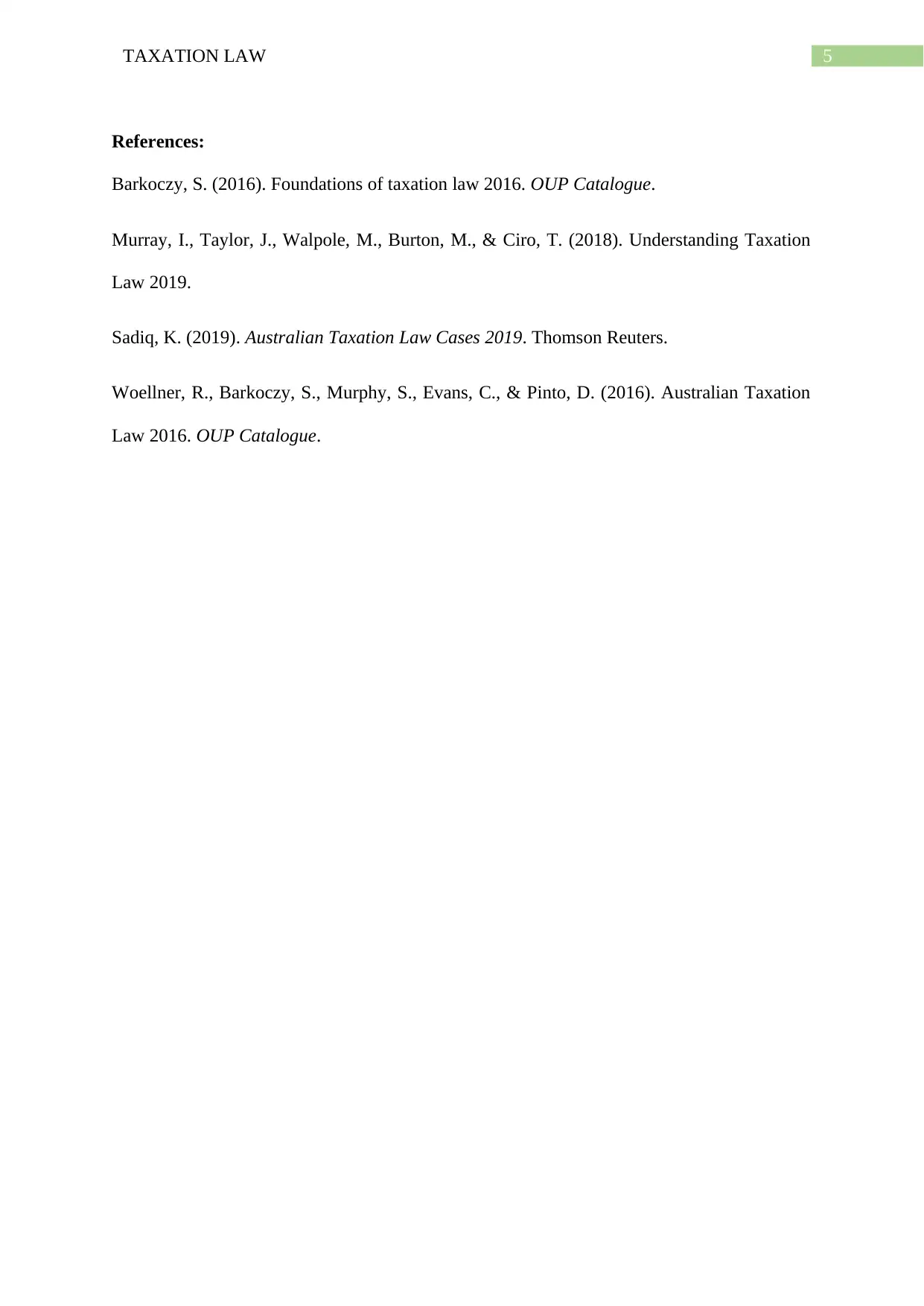
5TAXATION LAW
References:
Barkoczy, S. (2016). Foundations of taxation law 2016. OUP Catalogue.
Murray, I., Taylor, J., Walpole, M., Burton, M., & Ciro, T. (2018). Understanding Taxation
Law 2019.
Sadiq, K. (2019). Australian Taxation Law Cases 2019. Thomson Reuters.
Woellner, R., Barkoczy, S., Murphy, S., Evans, C., & Pinto, D. (2016). Australian Taxation
Law 2016. OUP Catalogue.
References:
Barkoczy, S. (2016). Foundations of taxation law 2016. OUP Catalogue.
Murray, I., Taylor, J., Walpole, M., Burton, M., & Ciro, T. (2018). Understanding Taxation
Law 2019.
Sadiq, K. (2019). Australian Taxation Law Cases 2019. Thomson Reuters.
Woellner, R., Barkoczy, S., Murphy, S., Evans, C., & Pinto, D. (2016). Australian Taxation
Law 2016. OUP Catalogue.
⊘ This is a preview!⊘
Do you want full access?
Subscribe today to unlock all pages.

Trusted by 1+ million students worldwide
1 out of 6
Related Documents
Your All-in-One AI-Powered Toolkit for Academic Success.
+13062052269
info@desklib.com
Available 24*7 on WhatsApp / Email
![[object Object]](/_next/static/media/star-bottom.7253800d.svg)
Unlock your academic potential
Copyright © 2020–2026 A2Z Services. All Rights Reserved. Developed and managed by ZUCOL.





